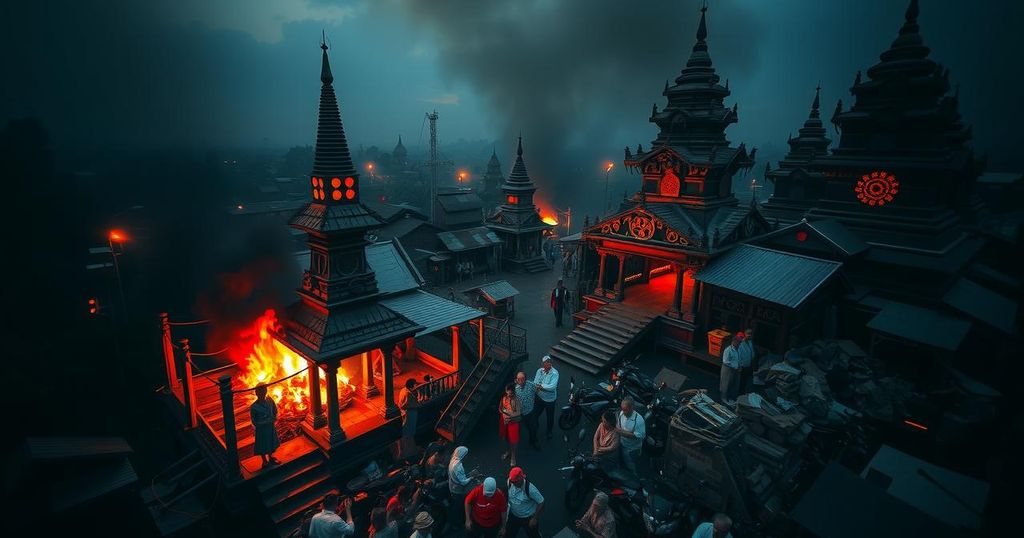Myanmar’s Civil Conflict: A Descent into Chaos and Humanitarian Crisis

The article examines Myanmar’s descent into civil war under military rule, drawing parallels to Syria. Anti-junta forces have made advances, yet the conflict is marked by atrocities on both sides, including the suffering of the Rohingya. Without an effective international response, Myanmar faces a grim future, where divisions prevent a hopeful resolution toward democracy and peace.
The situation in Myanmar under Min Aung Hlaing’s military junta has deteriorated significantly, resembling the chaos in Syria rather than a nation on the path to democracy. Anti-junta ethnic factions have gained momentum in their conflicts against the Tatmadaw, which is supported by China and Russia. However, the dynamics of the struggle are complex, with atrocities committed by both sides, undermining the simplistic narrative of good versus evil. The Rohingya people, previously victims of state-sponsored violence, now face dual persecution as they clash with anti-junta forces while also dealing with the brutality of the military regime. International observers, such as Nicholas Koumjian from the United Nations Independent Investigative Mechanism for Myanmar, have highlighted the unchecked violence and suffering inflicted on civilians. The persistent conflict, characterized by both state and ethnic violence, complicates any democratic aspirations, as various groups utilize rhetoric about democracy to legitimize their acts of aggression. In troubled regions like Rakhine, an ongoing genocide against Rohingyas exemplifies the failures of both the junta and rebel factions. While some groups, such as the Arakan Army, proclaim to fight for rights, they are implicated in exacerbating violence against non-combatant communities. Reports of forced conscription and resource blockades further contribute to the humanitarian crisis, drawing attention to the dire conditions under which civilians must navigate their lives. China’s recent alignment with Myanmar’s junta reflects a broader strategy to quell unrest and exert influence in the region. The lack of international recognition for the anti-junta National Unity Government and the ineffective measures of ASEAN demonstrate the disunity among nations regarding Myanmar’s fate. Meanwhile, the United States’ waning credibility as a global champion of democracy hinders its capacity to influence the situation positively. The absence of a coordinated international effort to cease hostilities contributes to an environment where the people of Myanmar experience unrelenting hardship. Activists within ASEAN have expressed solidarity with other causes, yet have remained silent on Myanmar, revealing a troubling disconnect regarding the moral implications of the country’s civil strife. As the anti-coup movement faces increasingly complex challenges, a shift from a zero-sum mentality is imperative for the various factions involved to forge a path toward healing and reconciliation.
Myanmar is currently embroiled in a complex civil conflict following a military coup that ousted elected leader Aung San Suu Kyi in 2021. The ensuing turmoil has escalated into a multi-faceted civil war involving various ethnic armed groups opposing the military junta, known as the Tatmadaw, which is backed by China and Russia. Key humanitarian issues, such as the systematic persecution of the Rohingya minority and escalating violence, continue to plague the country. With significant regional and international implications, Myanmar’s unstable political landscape reflects broader concerns over democracy, governance, and human rights in Southeast Asia.
In summary, Myanmar’s plight under military rule has led to a complex and brutal civil war, echoing the violence seen in Syria. The ongoing struggle among various factions and the international community’s failure to effectively address the crisis only exacerbate the suffering of civilians. Without a commitment to reconciliation and a broader understanding of the conflict, the divided nation risks descending into a permanent state of chaos, reflecting the moral ambiguity surrounding the resistance movements and the international response to the humanitarian crisis.
Original Source: asianews.network








